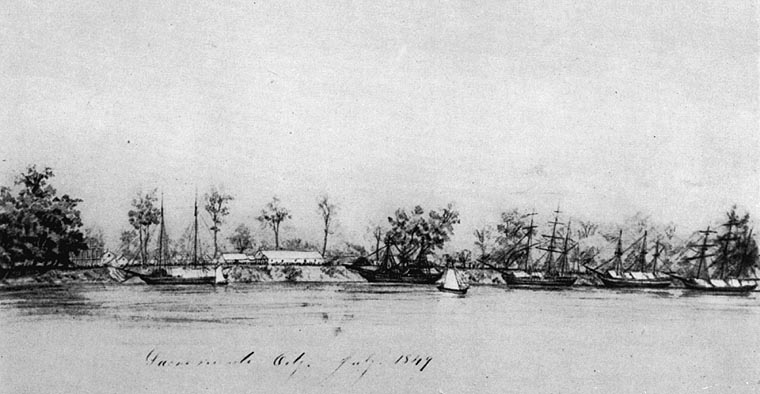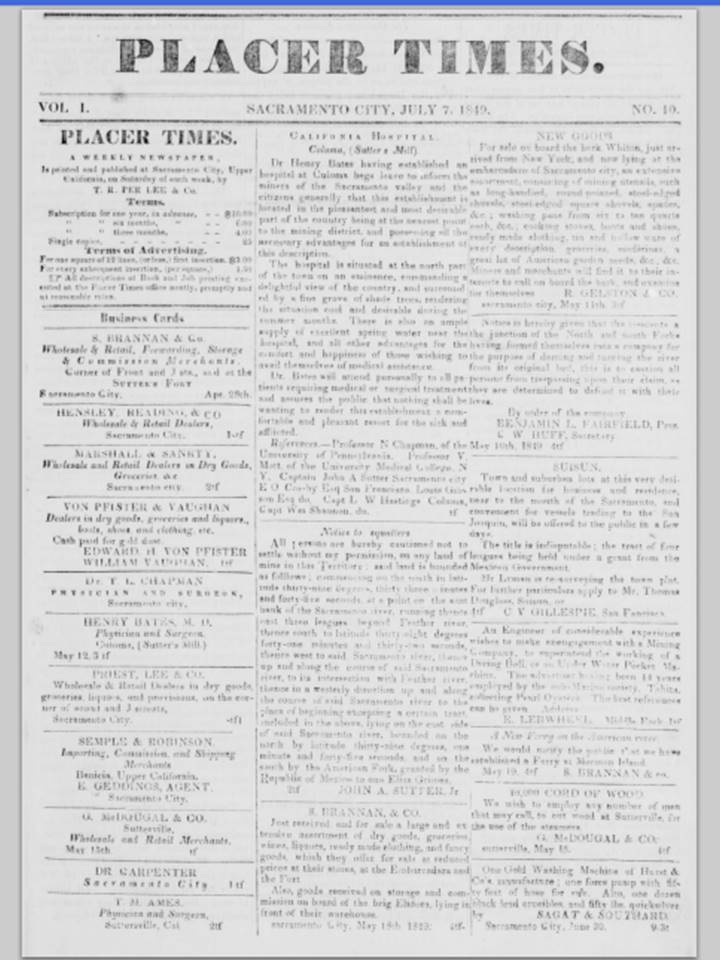
As I searched for a topic on the California Gold Rush to write about this month, I came across issues for the Sacramento Placer Times in July 1849. At that time, Sacramento was a burgeoning outpost at the confluence of the American and Sacramento Rivers. It still was not an incorporated town. The location had been established where John Sutter had built an embarcadero on the American, and it had become the gateway to the gold fields.
 Gambling houses and saloons were just coming into town in the summer of 1849. The issues of the Placer Times that July trumpet the wholesome nature of the town. The July 7, 1849, edition, describes the recent celebration of Independence Day:
Gambling houses and saloons were just coming into town in the summer of 1849. The issues of the Placer Times that July trumpet the wholesome nature of the town. The July 7, 1849, edition, describes the recent celebration of Independence Day:
The Fourth of July. — The Anniversary of our country’s independence was duly observed by the citizens of Sacramento City. — There was the usual display of fireworks and salutes in honor of the Day. At half past 1 o’clock a respectable audience assembled in the edge of the beautiful grove of oaks skirting the plain and in rear of the city, to listen to an address from Rev. Dr. Deal, recently from Baltimore. The exercises were opened with prayer by the Rev. S. C. Damon, from the Sandwich Islands; next followed the reading of the Declaration of Independence by Mr. McClellan, of this city. The address or Dr. Deal was highly appropriate and delivered with eloquence. As the audience was expecting the exercises to conclude with remarks by the Hon. Mr. Gwynn, the speaker very judiciously made his address quite brief. The remarks of Mr. G. (formerly U. S. Senator from Mississippi.) were designed to urge upon the citizens of California the importance of immediately organizing a State Government. The day passed off with order and quietness. As succeeding years roll away may a goodly number of patriotic American citizens be found, in this growing city, who will duly honor and becomingly celebrate the anniversary of our county’s independence.
And such were the hopes of the editors for the growing town of Sacramento City. A week later, on July 14, 1849, the paper describes the town’s growth and prospects in a series of paragraphs:
Our City — Our little city is growing with a rapidity unequalled by any modern town save San Francisco, in Alta California; and one can scarcely keep trace of the daily improvements which labor and genius are exerting to raise a magic city, where a few months ago the deer and buffalo grazed unmolested upon the banks of the beautiful Sacramento. And ours is a real city too, not a paper town, like many we could name; not a 36 Buffalo water lot speculation, but a genuine timber and canvass city, replete with industry, enterprise, trade and commerce;—and so thoroughly Americanized are we, in all our customs, that already one fancy’s himself in the states. You may purchase your breakfast at the Washington Market, dine at Sweeny’s, and drink your glass at the Shades. You will meet with but few or no idlers, each seems intent on making his fortune and that speedily. Loads of Yankees are arriving hourly, and the retail trade established by the new adventurers will almost rival Chatham or Catharine streets.
“Morality in the Mines — We will venture to affirm that the standard of morals among the miners is much higher than in any town in the states south of Boston. We speak from knowledge of the mines tributary to the Sacramento; of those on the San Joaquin we learn that quite the reverse exists; but on the branches of the Sacramento every man’s rights are scrupulously respected. Very seldom you meet with a drunken man, less often with gambling or quarreling. Indeed, the good order and respect for rights is a theme of general admiration by all new comers.
“Turning Rivers. — Large companies of miners are engaged in turning the course of streams in which gold may be found. On the North Fork of the American river the stream is being turned at four points. Also on the Middle Fork, and at Mormon Island. The probability is that the companies will reap large rewards for their outlays, but the chances may be against them—in which case they will loose their whole summer’s arduous labor.

Such, then, is what the editors of the Placer Times wanted to see in Sacramento. Yet, on July 21, 1849, the paper was obliged to print a less positive view of the area, in a notice submitted by John Sutter himself:
Notice to squatters
All persons are hereby cautioned not to settle without my permission, on any land of mine in this territory: said land is bounded as follows; [detailed description of the property] . . . JOHN A. SUTTER
It seems, then, that the people around Sacramento were not quite as wholesome as the Placer Times editors led readers to believe.
Moreover, there was dissension among the residents of the city, as one resident sends a testy letter to the editor in response to an earlier article. This letter was published in the July 21, 1849, edition:
Mr. Editor: Sir—In No. 10 of the Placer Times, the author of the article signed ‘ L ‘ complains of the free trade principle as injurious to his individual interests, (touching his most sensitive point,) and I presume to say that no candid man in this community will deny his sincerity. But as to his having purchased a lot and house and intending to become a permanent resident of this city being an argument for complaint against other men’s right to buy and sell goods as best suits their individual interests, is no argument whatever; and I ask, is ‘L.’ an intelligent citizen of the United States and ignorant of the fact that what he considers, as he expresses himself, (against natural if not legal right,) is and has been permitted on the Atlantic side of this republic since its foundation? Yours, LAR.
Perhaps the editors of the Placer Times in July 1849 were determined to be civic boosters, touting the benefits of their town in terms more laudatory than truth and human nature deserved.
I am always amused when I turn to the pages of these 19th century newspapers and see how little has changed in the past 160 years.
When have you noticed conflicts between news accounts and truth as you knew it?



